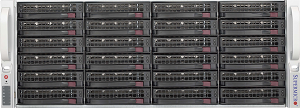SAN/NAS servers edit page: Difference between revisions
Created page with "Category:ibm_guide QuantaStor’s SAN/NAS Storage Servers provide file and block storage solutions suitable for a broad spectrum of workloads. IBM Cloud customers have the..." |
mNo edit summary |
||
| Line 28: | Line 28: | ||
|<center>iSCSI / FC<br>NFS / CIFS /SMB</center> | |<center>iSCSI / FC<br>NFS / CIFS /SMB</center> | ||
|<center>Server Virtualization / VDI<br> Database Storage</center> | |<center>Server Virtualization / VDI<br> Database Storage</center> | ||
| | |Intel Xeon Dual E5-2620 / 12x LFF bay server<br>64GB ECC RAM<br>QuantaStor 5.x 16TB (SM) Image<br>2x960GB SATA SSDs (RAID1/boot)<br>8 x 2TB Enterprise SATA HDD (data)<br>2 x 960GB Enterprise SATA SSD (write log)<br>2 x 10 Gbps Redundant Private Network Uplinks | ||
| | |{{QsButton|https://bit.ly/2KXF6CC|View Design}}<br>[[File:Svr_supermicro_2u12_6029p.png | center]] | ||
|- | |- | ||
|<center>12TB / 8TB<br>(RAID 60 / 4+2 parity)</center> | |<center>12TB / 8TB<br>(RAID 60 / 4+2 parity)</center> | ||
| Line 35: | Line 35: | ||
|<center>iSCSI / FC<br>NFS / CIFS /SMB</center> | |<center>iSCSI / FC<br>NFS / CIFS /SMB</center> | ||
|<center>NAS Archive<br> Disk-to-Disk Backup<br> Data Analytics</center> | |<center>NAS Archive<br> Disk-to-Disk Backup<br> Data Analytics</center> | ||
| | |Intel Xeon Dual E5-2620 / 12x LFF bay server<br>64GB ECC RAM<br>QuantaStor 5.x 16TB (SM) Image<br>2x960GB SATA SSDs (RAID1/boot)<br>6 x 2TB Enterprise SATA HDD (data)<br>2 x 960GB Enterprise SATA SSD (write log)<br>2 x 10 Gbps Redundant Private Network Uplinks | ||
|<center>{{QsButton|https://bit.ly/2KXF6CC|View Design}}<br>[[File:Svr_supermicro_2u12_6029p.png | center]]</center> | |<center>{{QsButton|https://bit.ly/2KXF6CC|View Design}}<br>[[File:Svr_supermicro_2u12_6029p.png | center]]</center> | ||
|- | |- | ||
Revision as of 22:10, 23 May 2019
QuantaStor’s SAN/NAS Storage Servers provide file and block storage solutions suitable for a broad spectrum of workloads. IBM Cloud customers have the option of provisioning Hybrid SAN/NAS configurations that utilize SSD to accelerate write performance or All-Flash SAN/NAS configurations that offer the ultimate high-performance characteristics. IBM's Bare Metal servers give you full control over your dedicated appliance, while QuantaStor’s web-based management interface, REST APIs and QS CLI make storage provisioning and automation easy.
Key Features
- Provides NFS, SMB and iSCSI storage
- Compression
- Remote-replication between QuantaStor Systems across IBM data centers and on-premises locations for hybrid cloud.
- Snapshot Schedules with long term snapshot retention options.
- Easy web-based management with Storage Grid technology
- Automatable via QS CLI and REST API
- VMware certified and VMware VAAI integrated
- End-to-end Security
Reference Configurations
SAN/NAS - HYBRID SOLUTIONS
SAN/NAS - ALL-FLASH SOLUTIONS
Quick Configuration Steps
Step One: Storage Management Tab → Controllers & Enclosures → Right-click Controller → Configure Pass-thru devices → Select all → Click OK
Step Two: Storage Management Tab → Storage Pools → Create Storage Pool → Click OK
For iSCSI Block Storage Provisioning:
- Storage Management Tab → Hosts → Add Host → Enter host IQN → Click OK (do this for each host)
- Storage Management Tab → Storage Volumes → Create Storage Volume → Enter volume name, select a size, → Click OK
- Storage Management Tab → Hosts → Right-click Host → Assign Volumes → Select volumes → Click OK
For NFS/SMB File Storage Provisioning:
- Storage Management Tab → Network Shares → Create Network Share → Click OK (do this for each share)
- Storage Management Tab → Network Shares → Modify Network Share & SMB Access → Adjust Settings → Click OK (do this for each share)
Multi-site Storage Management
Add additional drives to expand capacity. Additional systems may be added to a given QuantaStor Storage Grid for easy management of all systems across IBM data centers. OSNEXUS recommends provisioning 36 bay servers as expansion disk-enclosures are not available as an add-on after the initial server provisioning.

